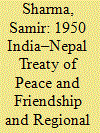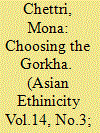| Srl | Item |
| 1 |
ID:
189552


|
|
|
|
|
| Summary/Abstract |
Regional demands for statehood in India have had an aspiration towards a ‘nationalisation’ of their issues in the hopes of accommodation. In the case of the Gorkhaland movement for separate statehood in northern West Bengal, the competition among regional forces to occupy and share a ‘national political space’ from the ‘margins’ has fuelled the increasing employment of debates regarding international treaty obligations. While there are numerous factors that are the causes of regional political mobilisation, the demand for the abrogation of Article VII of the India–Nepal Treaty of Peace and Friendship (1950) has nevertheless remained as one of its central themes. This symbolises an accentuation in the anxieties of citizenship and belonging to the nation. Examining these amid the important issues relating to unsuccessful invocations from Nepal for a Brihat Nepal (Greater Nepal), and the constitution of the Eminent Persons Group (EPG) for India–Nepal relations, the article concludes that there will not be any radical change in the status quo of India’s international treaty obligations with Nepal despite repeated demands by regional actors in India. This is indicated in an elusive ‘permanent political solution’ declared by the ruling party in India as a response to the regional political mobilisation that will possibly depart from the debates that invoke and demand transformations to India’s treaty obligations with Nepal.
|
|
|
|
|
|
|
|
|
|
|
|
|
|
|
|
| 2 |
ID:
126659


|
|
|
|
|
| Publication |
2013.
|
| Summary/Abstract |
The Darjeeling hills in northern West Bengal, India are being demanded as a homeland for the Gorkha community living in India. While the origin of Darjeeling is steeped in the imperial legacy of the British Raj, the Gorkha, a colonial construct is ironically used as a means to challenge the contemporary political regression and neo-colonisation of Darjeeling. Although the Gorkha identity is deemed as representative of the Nepali community residing in India, it acquires special meaning and importance in the Darjeeling hills, where majority of the people suffer low wages, unemployment, underdevelopment and poverty. In spite of a large working force in the tea estates, economic underdevelopment and political disempowerment is voiced through the assertion of ethnic rather than a class-based identity. Through an examination of the interaction between class and ethnicity, the Gorkha identity will highlight the malleability of ethnicity to extend itself to any situation and the emergence of an ethnic identity from class relations and grievances.
|
|
|
|
|
|
|
|
|
|
|
|
|
|
|
|